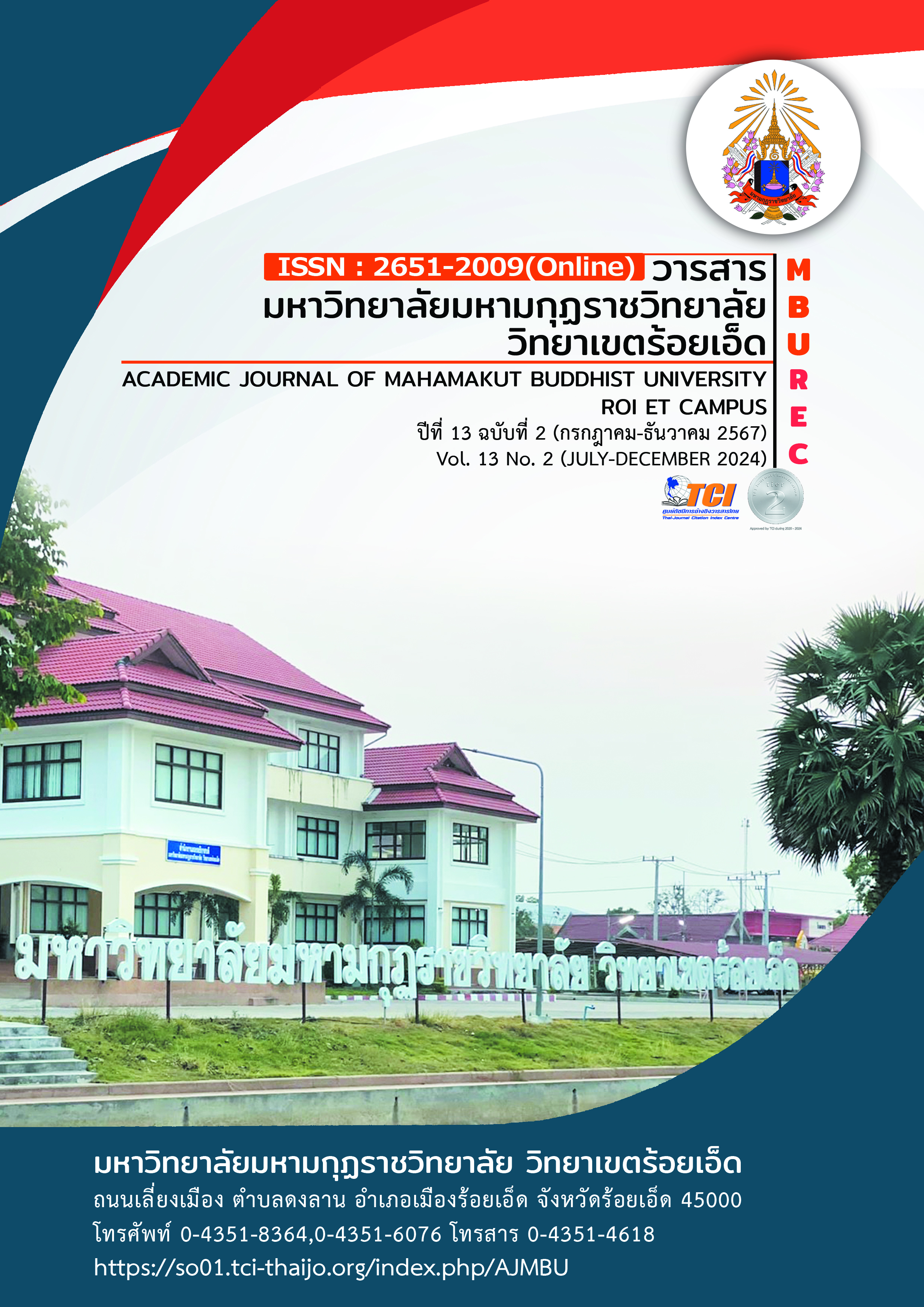THE DEVELOPMENT OF EDUCATIONAL INSTITUTION MANAGEMENT GUIDELINES BASED ON GOOD GOVERNANCE PRINCIPLES FOR THE SECONDARY EDUCATIONAL SERVICE AREA OFFICE BURIRAM
Main Article Content
Abstract
This study aims to 1) investigate the current state, desirable conditions, and essential needs of school administration based on the principles of good governance, and 2) develop guidelines for school administration based on the principles of good governance for schools under the supervision of the Secondary Educational Service Area Office in Buriram. The research utilized a mixed-methods design conducted in two phases. In Phase 1, the study focused on the current conditions, desirable conditions, and necessary needs for school administration based on the principles of good governance. The sample comprised 344 participants, including 83 school administrators and 261 teachers. The sample size was determined using Krejcie and Morgan's table, and the stratified random sampling technique was applied based on the sizes of educational institutions. To determine the final participant groups, a proportional sample size for each stratum was then determined. This evaluation involved five qualified experts. The research tools comprised questionnaires. In Phase 2, guidelines for school administration based on the principles of good governance were developed for schools under the supervision of the Secondary Educational Service Area Office in Buriram. This involved interviewing 11 school administrators from three schools that demonstrated best practices, selected through targeted sampling. Five qualified experts conducted the evaluation. The research tools included structured interview forms, suitability assessment forms, and feasibility assessment forms. Statistical analyses employed in data analysis included percentages, means, and standard deviations.
The research findings indicate that: 1) The current state of school administration, following the principles of good governance for schools under the supervision of the Secondary Educational Service Area Office in Buriram, is generally high. When examining specific aspects, it is rated high in two areas and moderately in two areas, with the average scores ranging from high to low. These areas include academic management, general management, personnel management, and budget management. The preferred condition for school administration, adhering to the principles of good governance for schools under the Secondary Educational Service Area Office in Buriram, is at the highest level overall. When examining specific aspects, the scores are highest for personnel management, budget management, general management, and academic management. 2) The developed guidelines for school administration, grounded in the principles of good governance, consist of four dimensions and 24 recommendations. The overall evaluation indicates that their suitability is at the highest level, and their overall feasibility is also at the highest level.
Article Details

This work is licensed under a Creative Commons Attribution-NonCommercial-NoDerivatives 4.0 International License.
References
กระทรวงศึกษาธิการ. (2555). คู่มือการบริหารโรงเรียนในโครงการพัฒนาการบริหารรูปแบบนิติบุคคล. กรุงเทพมหานคร : ชุมนุมสหกรณ์การเกษตรแห่งประเทศไทย จำกัด.
กระทรวงศึกษาธิการ. (2565). ประกาศกระทรวงศึกษาธิการ เรื่อง นโยบายและจุดเน้นของกระทรวงศึกษาธิการปีงบประมาณ พ.ศ. 2566. สืบค้นเมื่อ 5 มิถุนายน 2566. จาก https://www.moe.go.th/360policy-and-focus-moe-2023/
ขันแก้ว พรมคำ. (2564). การพัฒนาแนวทางการบริหารโดยใช้หลักธรรมาภิบาลของสถานศึกษาสังกัดองค์กรปกครองส่วนท้องถิ่นจังหวัดเลย. วิทยานิพนธ์ปริญญาการศึกษามหาบัณฑิตสาขาวิชาการบริหารและพัฒนาการศึกษา. บัณฑิตวิทยาลัย : มหาวิทยาลัยมหาสารคาม.
ถวิลวดี บุรีกุล. (2561). หลักธรรมาภิบาล : จากแนวคิดสู่การปฏิบัติในสังคมไทย. กรุงเทพมหานคร : สถาบันพระปกเกล้า.
นิพนธ์ ศศิธรเสาวภา. (2560). การบริหารกิจการท้องถิ่นที่ดีในประเทศไทย. ปทุมธานี : มหาวิทยาลัยธรรมศาสตร์.
บังอร สิมพันธ์. (2560). การพัฒนาแนวทางการดำเนินงานโดยใช้หลักธรรมาภิบาลสำหรับสถานศึกษาในสังกัดสำนักงานเขตพื้นที่การศึกษาประถมศึกษาอุดรธานี เขต 4. วิทยานิพนธ์ปริญญาการศึกษามหาบัณฑิต สาขาวิชาการบริหารและพัฒนาการศึกษา. บัณฑิตวิทยาลัย : มหาวิทยาลัยมหาสารคาม.
พงศ์ศิริ พวงศรีเคน. (2563). การพัฒนาแนวทางการบริหารสถานศึกษาโดยยึดหลักธรรมาภิบาล สำหรับโรงเรียน สังกัดสำนักงานเขตพื้นที่การศึกษามัธยมศึกษา เขต 33. วิทยานิพนธ์ปริญญาการศึกษามหาบัณฑิต สาขาวิชาการบริหารและพัฒนาการศึกษา. บัณฑิตวิทยาลัย : มหาวิทยาลัยมหาสารคาม.
ศุภณัฐ กุมภาว์. (2563). การพัฒนาแนวทางการบริหารสถานศึกษาโดยยึดหลักธรรมาภิบาลสำหรับโรงเรียน สังกัดสำนักงานเขตพื้นที่การศึกษาประถมศึกษาสุรินทร์ เขต 3. วิทยานิพนธ์ปริญญาการศึกษามหาบัณฑิต สาขาวิชาการบริหารและพัฒนาการศึกษา. บัณฑิตวิทยาลัย : มหาวิทยาลัยมหาสารคาม.
สำนักงานเขตพื้นที่การศึกษามัธยมศึกษาบุรีรัมย์. (2565). รายงานมาตรการส่งเสริมคุณธรรมและความโปร่งใสภายในหน่วยงานประจำปีงบประมาณ พ.ศ. 2565. บุรีรัมย์ : สำนักงานเขตพื้นที่การศึกษามัธยมศึกษาบุรีรัมย์.
อารยา บุตรพรม. (2559). การพัฒนาแนวทางการบริหารสถานศึกษาตามหลักธรรมาภิบาลของผู้บริหารสถานศึกษา สังกัดสำนักงานเขตพื้นที่การศึกษามัธยมศึกษา เขต 24. วิทยานิพนธ์ปริญญาการศึกษามหาบัณฑิต สาขาวิชาการบริหารและพัฒนาการศึกษา. บัณฑิตวิทยาลัย : มหาวิทยาลัยมหาสารคาม.
Prianto, Eko. (2020). Improving the Vocational School Performance through the Good School Governance. International Education Studies. 13(5). 57-71.
Stoner, A.F. and Wankel, C. (1986). Management. 3rd ed. New Delhi : Prentice–Hill.
Supriadi, D., Usman, H., Jabar, A., & Widyastuti, I. (2021). Good school governance: An approach to principal’s decision-making quality in Indonesian vocational school. Research in Educational Administration& Leadership. 6(4). 796-831.


